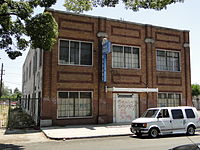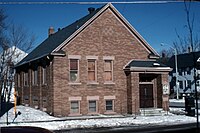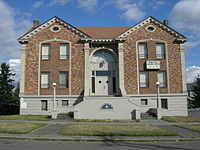Prince Hall Freemasonry
| Part of a series on |
| Freemasonry |
|---|
 |
Prince Hall Freemasonry is a branch of North American Freemasonry founded by Prince Hall on September 29, 1784 and composed predominantly of African Americans. There are two main branches of Prince Hall Freemasonry: the independent State Prince Hall Grand Lodges, most of which are recognized by Regular Masonic jurisdictions and those under the jurisdiction of the National Grand Lodge.
History
Petitions for admittance into existing lodges
Prior to the American Revolutionary War, Prince Hall and fourteen other free black men petitioned for admittance to the white Boston St. John’s Lodge.[1][2] They were declined.[3] The Masonic fraternity was attractive to some free blacks like Prince Hall because freemasonry was founded upon ideals of liberty, equality and peace.[1]
Grand Lodge of Ireland
Having been rejected by colonial American Freemasonry, Hall and 14 others sought and were initiated into Masonry through Lodge No. 441 of the Grand Lodge of Ireland on March 6, 1775. The military lodge was attached to the 38th Foot (renamed "The 1st Staffordshire Regiment") in 1782.[4] The Lodge was attached to the British forces stationed in Boston.[citation needed] Hall and other freedmen founded African Lodge No. 1 and he was named Grand Master. Other African Americans included Cyrus Johnston, Bueston Slinger, Prince Rees, John Canton, Peter Freeman, Benjamin Tiler, Duff Ruform, Thomas Santerson, Prince Rayden, Cato Speain, Boston Smith, Peter Best, Forten Horward, and Richard Titley, all of whom apparently were free by birth.[citation needed]
When black men wished to become Masons in the new nation the white members of the Lodge had to unanimously vote to accept a petitioner to receive Masonic degrees. If one white person voted against the petitioner that person would be rejected. In a letter by General Albert Pike to his brother in 1875 he said, "I am not inclined to mettle in the matter. I took my obligations to white men, not to Negroes. When I have to accept Negroes as brothers or leave Masonry, I shall leave it."[5] Masonic and Grand Lodges generally excluded African Americans. Since the votes were anonymous, it was impossible to identify the member who had voted against accepting a black member. The effect was the black men who had legitimately been made Masons in integrated jurisdictions could be rejected. Racial segregation existed until the 1960s and still persists in some jurisdictions.[citation needed]
The black Masons therefore had limited power. When the military lodges left the area, they were given the authority to meet as a lodge, take part in the Masonic procession on St. John’s Day, and bury their dead with Masonic rites but could not confer Masonic degrees or perform any other essential functions of a fully operating Lodge.[6]
Grand Lodge of England

Unable to create a charter, they applied to the Grand Lodge of England. The Grand Master of the Mother Grand Lodge of England, H. R. H. The Duke of Cumberland, issued a charter for the African Lodge No. 1 later renamed African Lodge no. 459 September 29, 1784.[3][7] The lodge was the country's first African Masonic lodge.[8]
Due to the African Lodge's popularity and Prince Hall's leadership, the Grand Lodge of England made Hall a Provincial Grand Master on January 27, 1791. His responsibilities included reporting on the condition of lodges in the Boston area. Six years later, on March 22, 1797 Prince Hall organized a lodge in Philadelphia, called African Lodge #459, under Prince Hall’s Charter. They later received their own charter. On June 25, 1797 he organized African Lodge (later known as Hiram Lodge #3) at Providence, Rhode Island.[9][10]
Author and historian James Sidbury said
"Prince Hall and those who joined him to found Boston's African Masonic Lodge built a fundamentally new "African" movement on a preexisting institutional foundation. Within that movement they asserted emotional, mythical, and genealogical links to the continent of Africa and its peoples.[11]
In 1788 John Marrant became the chaplain of the African Masonic Lodge.[12][13]
The lodge met in the “Golden Fleece”, located near Boston Harbor, during the 1780s and 1790s.[3] They later met at Kirby Street Temple in Boston.
Intervisitation attainment
By 1797 there were at least thirty-four members in the Boston black lodge, but still the lodge was overlooked by mainstream Boston Masons.[14] Integration with the American white Masons was not imminent. Since they were unable to attain integration, the blacks concentrated on recognition from white Masons that black Masonry, descending from Prince Hall of Massachusetts, was legitimate and not "clandestine". That it had received its charter from the English Grand Lodge and was thus entitled to all Masonic rights such as intervisitation between black and white lodges without prejudice.[15] Many Grand Masters hoped that ultimately recognition would lead to integration but they knew it would be a long time before that happened.[16]
African Grand Lodge
After the death of Prince Hall, on December 4, 1807, the brethren were eager to form a Grand Lodge. On June 24, 1808 they organized African Grand Lodge with the lodges from Philadelphia, Providence and Boston,[9] which was later renamed the Prince Hall Grand Lodge, in his honor.
The Lodge was struck from the rolls after the 1813 merger of the Antients and the Moderns (two rival Grand Lodges of England), along with many other Lodges. "At the amalgamation of the two Registers after the Union of the two Grand Lodges in England in 1813, African Lodge (and many others at home and abroad) was omitted from the register, there having been no contact for many years. African Lodge was, however, not formally erased."[citation needed]
Independent lodge
After being refused acknowledgment by the Grand Lodge of Massachusetts, the African Lodge declared itself to be an independent Grand Lodge, the African Grand Lodge of Massachusetts.
In 1827 the African Grand Lodge declared its independence from the United Grand Lodge of England, as the Grand Lodge of Massachusetts had done 45 years earlier. It also stated its independence from all of the white Grand Lodges in the United States.[3][17]
This led to a tradition of separate, predominantly African American jurisdictions in North America, which are known collectively as Prince Hall Freemasonry. Widespread racism and segregation in North America made it impossible for African Americans to join many mainstream lodges, and many mainstream Grand Lodges in North America refused to recognize as legitimate the Prince Hall Lodges and Prince Hall Masons in their territory.
For many years both Prince Hall and "mainstream" Grand Lodges have had integrated membership,[citation needed] though in some Southern states this has been policy but not practice. Today, some Prince Hall Grand Lodges are recognized by the Grand Lodge of England (UGLE) as well as the great majority of state Grand Lodges in the US and many international Grand Lodges. The situation is complicated by the level of recognition that is granted, with some lodges giving full "blanket" recognition to all Prince Hall Grand Lodges, while others put on limits with regard to issues such as "intervisitation rights" or treating the Prince Hall Grand Lodges as regular but foreign jurisdictions.[18]
Organization
There are two competing sets of organizations within Prince Hall Freemasonry. A minority of lodges, which are subject to the Prince Hall National Grand Lodge, are referred to as Prince Hall Origin, and the majority of lodges, which are subject to 41 independent state grand lodges, and are known as Prince Hall Affiliation.[19]
The Conference of Prince Hall Grand Masters determines the regularity of Prince Hall Freemasonry. All regular and recognized Prince Hall Grand Lodges are represented at the Conference. A comprehensive list of all Prince Hall grand lodges deemed regular is listed on the conference website. Each regular Grand Lodge traces its lineage back to African Lodge #459, where Prince Hall was made a Mason. The group using the name Prince Hall Origin has no affiliation to the conference of Prince Hall grand masters.[20][21]
National and international lodges
Today, predominantly black Prince Hall Grand Lodges exist in the United States, Canada, the Caribbean and Liberia, governing Prince Hall Lodges throughout the world.
The Prince Hall Grand Lodge of the Caribbean was founded with the aid, and assistance of the PHGL of California in 1960. It is located in Christ Church, Barbados, the location of Prince Hall’s birth. A monument to Prince Hall is erected outside of the Grand Lodge.[22]
-
Prince Hall Masonic Temple (Los Angeles, California)
-
Prince Hall Masonic Temple (Madison, WI)
-
Prince Hall Masonic Temple (Washington, D.C.)
-
Prince Hall Masonic Temple (Seattle, WA)
Legacy
Hall’s legacy as a Freemason and a leader has survived with the lodges; Hall has been considered the "father of African-American Freemasonry". As a Georgia Mason noted, the original local lodge rules written by Prince Hall and his followers in the late 18th century were the first set of regulations drafted by colored men for self-government in the United States and Masonry ever since has striven to teach its members ‘the fundamentals of central government’ which is the basis of American life.”[3][15]
After nearly two centuries of controversy, the Grand Lodge of England was asked to decide the matter of Prince Hall Masonic legitimacy.
While no Grand Lodge of any kind is universally recognized, at present, Prince Hall Masonry is recognized by some UGLE-recognized Grand Lodges and not by others, but appears to be working its way toward further recognition.[23]
When two Grand Lodges recognize and are in Masonic communication with each other, they are said to be in amity, and the brethren of each may visit each other's lodges and interact Masonically. When two Grand Lodges are not in amity, inter-visitation is not allowed.[24] Exclusive Jurisdiction can be waived when the two over-lapping Grand Lodges are themselves in Amity and agree to share jurisdiction (for example, since the Grand Lodge of Connecticut is in Amity with the Prince Hall Grand Lodge of Connecticut, the principle of Exclusive Jurisdiction does not apply, and other Grand Lodges may recognize both).[25]
After carefully studying the records, the Grand Lodge of England concluded that the Prince Hall Grand Lodge of Massachusetts was indeed entitled to Masonic recognition, despite the general tradition that, per state, only one recognized Masonic body should exist.
According to data compiled in 2011, 42 out of the 51 mainstream U.S. Grand Lodges recognize Prince Hall Grand Lodges. The mainstream state Grand Lodges that do not recognize Prince Hall Grand Lodges are located largely in southern states, an area with an estimated 50% of Prince Hall Freemasons:[26] Alabama, Georgia, Tennessee, Mississippi, Florida, Louisiana, Arkansas, South Carolina and West Virginia.[27] While African-Americans can join any lodge in North America, Prince Hall Masonry remains a vital part of American tradition.[28]
Notable members
There are many notable Masons who were affiliated with Prince Hall originated Grand Lodges. Among the first Grand Masters, Prince Hall African Lodge #459:
- Prince Hall, Boston, Massachusetts, Grand Master 1791–1807
- Nero Prince, Boston, Massachusetts, Grand Master 1808
- George Middleton, Boston, Massachusetts, Grand Master 1809–1810. Commander, Bucks of America, a unit of black soldiers during the American Revolution. The unit received a flag from Governor John Hancock for its faithful service. Middleton was also a founder of the African Benevolent Society.
- Peter Lew, Dracut, Massachusetts, Grand Master 1811–1816, son of Barzillai Lew
- Sampson H. Moody, Grand Master 1817–1825
- John T. Hilton, Grand Master 1826–1827 Hilton helped organize the National Grand Lodge of Prince Hall Freemasonry and served as the first National Grand Master. Hilton was Grand Master of the National Grand Lodge of North America for ten years.[29]
- Walker Lewis, Lowell, Massachusetts, Grand Master 1829–1830. After the African Lodge declared its independence from the Grand Lodge of London and became its own African Grand Lodge, Walker Lewis was the Grand Master of African Grand Lodge #1 for 1829 and 1830.
- Thomas Dalton, Boston, Massachusetts, Grand Master 1831–1832, son-in-law of Barzillai Lew. He and David Walker oversaw the publication of John T. Hilton's An Address, Delivered Before the African Grand Lodge of Boston, No. 459, June 24th, 1828, by John T. Hilton: On the Annual Festival, of St. John the Baptist (Boston, 1828).[30]
The Prince Hall Grand Lodge of North Carolina reported that Nelson Mandela was made a Mason “on sight” in Atlanta, Georgia on June 28, 1990 by Past Grand Master William C. Parker Jr. of the Most Worshipful Prince Hall Grand Lodge of North Carolina (MWPHGLNC).[31]
See also
- Prince Hall Mystic Cemetery
- List of Freemasons
- Masonic Order of Liberia
- List of African-American Greek and fraternal organizations
Footnotes
- ^ a b Maurice Wallace, “Are We Men?: Prince Hall, Martin Delany, and the Masculine Ideal in Black Freemasonry,” American Literary History, Vol. 9, No. 3.
- ^ Freemasonry British Columbia and Yukon. Prince Hall.
- ^ a b c d e James Sidbury Professor of History University of Texas at Austin (August 29, 2007). Becoming African in America : Race and Nation in the Early Black Atlantic: Race and Nation in the Early Black Atlantic. Oxford University Press. p. 74. ISBN 978-0-19-804322-5. Retrieved April 25, 2013.
- ^ princehall.org A Brief History of Prince Hall Freemasonry in Massachusetts Prince Hall. Retrieved July 16, 2012
- ^ William H. Upton, Negro Masonry, (New York: AMS Press, 1975).
- ^ Joanna Brooks, “Prince Hall Freemasonry, and Genealogy,” African American Review, Vol. 34, No. 2.
- ^ Sidney Kaplan and Emma Nogrady Kaplan, The Black Presence in the Era of the American Revolution (Amherst: University of Massachusetts Press, 1989; ISBN 0-87023-663-6), p. 203.
- ^ James Sidbury Professor of History University of Texas at Austin (August 29, 2007). Becoming African in America : Race and Nation in the Early Black Atlantic. Oxford University Press. p. 41. ISBN 978-0-19-804322-5. Retrieved April 25, 2013.
- ^ a b Coleman, 2007. Prince Hall History Education Class, Grand Historian Prince Hall Grand Lodge Free and Accepted Masons Jurisdiction of Massachusetts
- ^ James Sidbury (August 29, 2007). Becoming African in America : Race and Nation in the Early Black Atlantic. Oxford University Press. pp. 68, 74. ISBN 978-0-19-804322-5. Retrieved April 25, 2013.
- ^ James Sidbury (August 29, 2007). Becoming African in America : Race and Nation in the Early Black Atlantic. Oxford University Press. p. 73. ISBN 978-0-19-804322-5. Retrieved April 25, 2013.
- ^ "John Marrant, America's first black preacher 1755-1791". Black History Review.
- ^ James Sidbury (August 29, 2007). Becoming African in America: Race and Nation in the Early Black Atlantic. Oxford University Press. p. 85. ISBN 978-0-19-804322-5. Retrieved April 25, 2013.
- ^ Loretta J. Williams, Black Freemasonry and Middle-Class Realities, (University of Missouri Press, 1980).
- ^ a b Williams A. Muraskin, Middle Class Blacks in a White Society, (Los Angeles: University of California Press, 1975).
- ^ Lamont D. Thomas. Paul Cuffe: Black Entrepreneur and Pan-Africanist (Urbana and Chicago: University of Illinois Press, 1988), pp. 126–7.
- ^ Theda Skocpol, "Organizations Despite Adversity: The Origins and Development of African American Fraternity Associates", Social Science History, Volume 28, Number 3.
- ^ Prince Hall Masonry Recognition details, Paul Bessell
- ^ Prince Hall Revisited
- ^ [1]
- ^ Report From The United Grand Lodge of England Prince Hall Masonry and the Prince Hall Grand Lodge of Massachusetts, Accessed June 9, 2012.
- ^ "History of the Prince Hall Grand Lodge of the Caribbean". PGHL Caribbean. January 6, 2014.
- ^ "Who is Prince Hall?", accessed on February 9, 2006.
- ^ Pilar lodge Jim Bantolo, On Recognition, Masonic Short Talk, 2007, retrieved 25 November 2013
- ^ Paul M. Bessel, Exclusive Jurisdiction, 1998, retrieved 25 November 2013
- ^ Prince Hall Masonry Recognition details
- ^ "Prince Hall Masonry Recognition details: Map of U.S. Recognition Status". Bessel.org. October 18, 2011. Retrieved February 19, 2013.
- ^ [2].
- ^ Cromwell (1994). The Other Brahmins: Boston's Black Upper Class, 1750-1950. University of Arkansas Press. p. 225. ISBN 978-1-61075-293-0. Retrieved May 2, 2013.
- ^ Peter Hinks (1997). To Awaken My Afflicted Brethren: David Walker and the Problem of Antebellum Slave Resistance. Penn State Press. p. 116. ISBN 978-0-271-04274-9. Retrieved April 23, 2013.
- ^ . PHGL of North Carolina. December 2013 http://www.mwphglnc.com/airtel/1205304.
{{cite news}}: Missing or empty|title=(help)
Further reading
- Peter P. Hinks and Stephen Kantrowitz (eds.), All Men Free and Brethren: Essays on the History of African American Freemasonry. Ithaca, NY: Cornell University Press, 2013.
- Gregory S. Kearse, “The Bucks of America & Prince Hall Freemasonry” Prince Hall Masonic Digest Newspaper, (Washington, D.C. 2012), 8.
- Alton G. Roundtree and Paul M. Bessel, Out of the Shadows: Prince Hall Freemasonry in America, 200 Years of Endurance. Forestville MD: KLR Publishing, 2006.
External links
- Conference of Grand Masters Prince Hall Masons, Inc.- an umbrella group for Prince Hall affiliated Grand Lodges and Grand Chapters of the Eastern Star.
- Prince Hall Freemasonry
- A directory of Prince Hall Affiliated Grand Lodges
- Prince Hall Revisited by Tony Pope, editor of the Australian & New Zealand Masonic Research Council's publications.
- The Black Heritage Trail The George Middleton House Boston African-American National Historic Site
- Museum of Afro-American History website George Middleton house and has photo of Bucks of America flag-for reference only}
- Famous Prince Hall Freemasons




